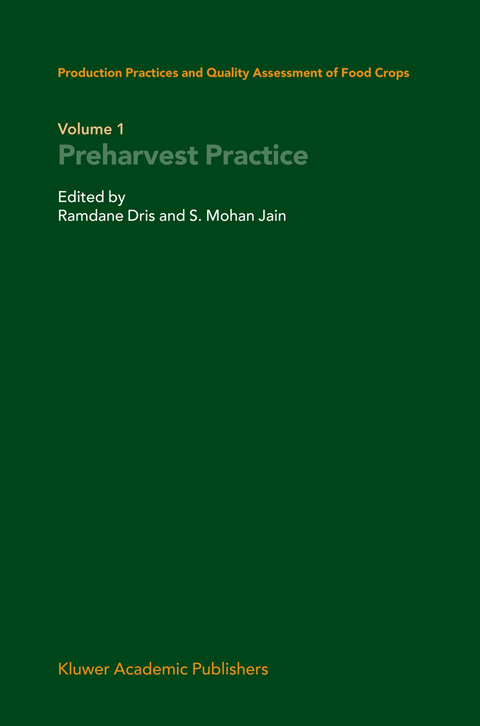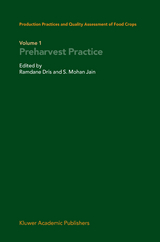Production Practices and Quality Assessment of Food Crops
Volume 1 Preharvest Practice
Seiten
2004
Springer-Verlag New York Inc.
978-1-4020-1698-1 (ISBN)
Springer-Verlag New York Inc.
978-1-4020-1698-1 (ISBN)
Today, in a world with abundant food, more than 700 million people are chro- cally undernourished. The responsibility of governments for ensuring food security will grow proportionately with the growth of populations, and governments bear a special responsibility for promoting agricultural inputs.
Today, in a world with abundant food, more than 700 million people are chro- cally undernourished. Over the next 20 years, the world’s population will probably double. The global food supply would need to double or to triple for the larger population to be fed adequately. Agriculture is closely linked to environmental quality in a variety of ways, and the challenge of our generation is how to feed a growing planet while maintaining the integrity of our ecological life-support system. The responsibility of governments for ensuring food security will grow proportionately with the growth of populations, and governments bear a special responsibility for promoting agricultural inputs. Agriculture in the 21st century, will certainly focus increasingly on adapting modern technologies to local farming systems, needs and environments. Worldwide climatic changes have been raising concerns about potential changes to crop yields and production systems. Such concerns include the ability to acc- modate these uncertain effects in order to ensure an adequate food supply for an increasing population. What can be done concretely to use agriculture to address some of the fundamental issues of today’s world? We must recognize that agric- ture is part of the solution and not just a problem. Agricultural development is a key to social stability and equity in many parts of the world. It can help to al- viate the subtle and unspoken fears of modernization and the space of change if innovation is handled transparently.
Today, in a world with abundant food, more than 700 million people are chro- cally undernourished. Over the next 20 years, the world’s population will probably double. The global food supply would need to double or to triple for the larger population to be fed adequately. Agriculture is closely linked to environmental quality in a variety of ways, and the challenge of our generation is how to feed a growing planet while maintaining the integrity of our ecological life-support system. The responsibility of governments for ensuring food security will grow proportionately with the growth of populations, and governments bear a special responsibility for promoting agricultural inputs. Agriculture in the 21st century, will certainly focus increasingly on adapting modern technologies to local farming systems, needs and environments. Worldwide climatic changes have been raising concerns about potential changes to crop yields and production systems. Such concerns include the ability to acc- modate these uncertain effects in order to ensure an adequate food supply for an increasing population. What can be done concretely to use agriculture to address some of the fundamental issues of today’s world? We must recognize that agric- ture is part of the solution and not just a problem. Agricultural development is a key to social stability and equity in many parts of the world. It can help to al- viate the subtle and unspoken fears of modernization and the space of change if innovation is handled transparently.
Effect of Preharvest Factors on the Quality of Vegetables Produced in the Tropics.- Effects of Agronomic Practices and Processing Conditions on Tomato Ingredients.- Modelling Fruit Quality: Ecophysiological, Agronomical and Ecological Perspectives.- Spray Technology in Perennial Tree Crops.- Chestnut, an Ancient Crop with Future.- Improvement of Grain Legume Production in Semi-Arid Kenya Through Biological Nitrogen Fixation: the Experience With Tepary Bean (Phaseolus Acutifolius A. Gray Var. Latifolius).- Impact of Ozone on Crops.- Saffron Quality: Effect of Agricultural Practices, Processing and Storage.- Fruit and Vegetables Harvesting Systems.
| Erscheint lt. Verlag | 31.1.2004 |
|---|---|
| Reihe/Serie | Production Practices and Quality Assessment of Food Crops. Volume 1-4 ; BD 1 | 1.20 |
| Zusatzinfo | X, 286 p. |
| Verlagsort | New York, NY |
| Sprache | englisch |
| Maße | 156 x 234 mm |
| Themenwelt | Medizin / Pharmazie ► Gesundheitsfachberufe ► Diätassistenz / Ernährungsberatung |
| Naturwissenschaften ► Biologie ► Biochemie | |
| Naturwissenschaften ► Chemie | |
| Technik ► Lebensmitteltechnologie | |
| Weitere Fachgebiete ► Land- / Forstwirtschaft / Fischerei | |
| ISBN-10 | 1-4020-1698-0 / 1402016980 |
| ISBN-13 | 978-1-4020-1698-1 / 9781402016981 |
| Zustand | Neuware |
| Haben Sie eine Frage zum Produkt? |
Mehr entdecken
aus dem Bereich
aus dem Bereich
Indikation, Diagnostik, Therapie
Buch (2024)
Thieme (Verlag)
80,00 €
Physiologische Grundlagen, Prävention, Therapie
Buch | Hardcover (2023)
Wissenschaftliche Verlagsgesellschaft
118,00 €




